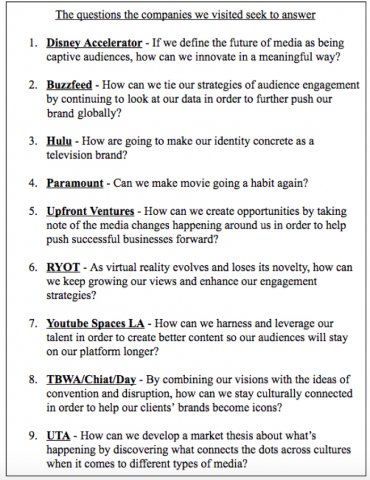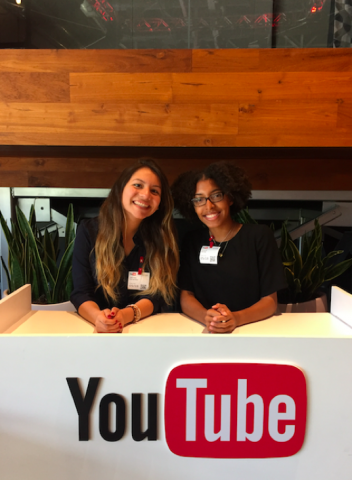“My name is Gabriela Fernandez and I’m a rising senior studying Broadcast and Digital Journalism and Narrative Studies.”
For a week in May, I and several other students went on a trek through Los Angeles, visiting nine companies that sit at the intersection of media and technology. The program, led by the Media, Economics and Entrepreneurship program, was called M{2e} @ Work. Our goal was to try to understand where this big, messy business of media was heading and how we might play a role in shaping its future.
So those were the words I used to introduce myself at each company visit. I wondered how my experiences and ideas would fall into place in a program that focused on how technology and consumer habits are reshaping the media industry’s business models.
 From our first meeting at the Disney Accelerator to our last at the United Talent Agency, it became clear how my schooling and skillset fit into a world I did not know I could be a part of.
From our first meeting at the Disney Accelerator to our last at the United Talent Agency, it became clear how my schooling and skillset fit into a world I did not know I could be a part of.
All the companies opened their doors to us to paint a picture of how technology has shaped their development and how disruption continues to challenge their environments. Key industry leaders offered their insight about the volatile media industry, answered our questions and provoked us to think about how the idea of “connection” could ultimately link back to consumers and create a profitable business.
I stepped into my first brief without a clue as to how I could be part of a technology or business organization until I realized I already am an integral part of it — both as a consumer and a storyteller.
Just like as a snowball picks up speed, terms like “return on investment,” “brand value” and “venture capital” started to make sense to me. Each company, whether it was a media start up, traditional film studio or advertising firm, led back to the idea of storytelling.
Without people to bring any business idea to life, no matter how far-fetched or standard it might be, it will remain just that — an idea.
My cohort was reminded of this notion when we visited Santa Monica-based Upfront Ventures, one of the region’s premier venture capital firms. Kerry Bennett, the head of marketing, told us that businesses are essentially driven by their ability to tell a story in a genuine way.
My two majors, Journalism and Narrative Studies, revolve around storytelling. Having the ability to communicate with others throughout the world of business enabled me to understand that storytelling is not limited to fairy tales or fables. Storytelling is a powerful business tool.
 When we visited the Disney Accelerator, we learned how the world’s largest entertainment company forges relationships with start-ups by inserting its brand and intellectual property into these young companies in order to dramatically increase value. Connecting a Disney character with a piece of innovative technology can launch a whole new company.
When we visited the Disney Accelerator, we learned how the world’s largest entertainment company forges relationships with start-ups by inserting its brand and intellectual property into these young companies in order to dramatically increase value. Connecting a Disney character with a piece of innovative technology can launch a whole new company.
In addition, learning how businesses use data to discover trends was fascinating. My fellow students and I are exactly the type of people many of these companies want to reach. These businesses aim to pick our brains to see what we want to consume, how we want to consume it and how they can reel us back in.
Things I often take for granted — like scrolling through social media and liking celebrity’s posts on Instagram, binge watching YouTube videos or commenting on a funny viral video on Facebook all have an impact. Whenever we partake in one of these seemingly mindless activities, we are guiding various companies into their next business strategies. With just the tap of our fingers, we are actively displaying what we like, don’t like and what we want our friends to see.
By the end of the program, I understood how vital everyone in my cohort was to so many businesses. The exchange of information and knowledge we obtained from these nine companies gave me a new sense of confidence and excitement for new career prospects.
Above all, the most valuable takeaway I recognized was that we are the future.